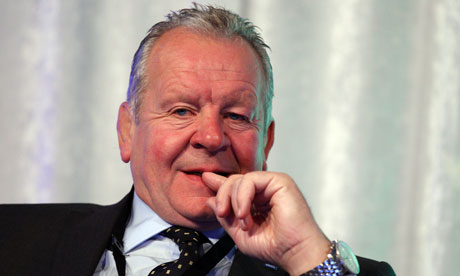
Relations between the four home unions and Australia have plummeted 18 months before the Lions fly out to meet the World Cup semi-finalists for a three-Test tour following the acrimonious vote for the chairman of the International Rugby Board, a battle won narrowly by the incumbent, Bernard Lapasset, over the former England captain Bill Beaumont.
Lapasset beat Beaumont by 14 votes to 12, two months after the original vote at a meeting in Auckland was postponed at the intervention of Australia when, as tempers rose, it became clear that neither man was going to achieve a majority.
While New Zealand backed Beaumont, Australia and South Africa were key supporters of Lapasset. Pressure was exerted on them by the home unions to switch allegiance and it is understood one bargaining chip included the lucrative internationals in Europe every November. The issue of commercial assistance during Lions tours was also discussed, it is understood.
The home unions suffered one of their worst days in the IRB's history and, for the first time in the professional era, supply neither the chairman nor vice-chairman. After failing to become chairman Beaumont stood as vice-chairman, the position he has held for the last four years. He had tried to cut a deal the night before with Lapasset but the Frenchman said he would not betray his running mate, South Africa's Oregan Hoskins.
Hoskins and Beaumont each received 13 votes after the Asian Rugby Union, which backed Lapasset, switched its support but the chairman's casting vote decided it in favour of the South African. Beaumont was elected on to the IRB's executive committee but he will lose his place on 1 January unless the Rugby Football Union elects him as a representative in place of Martyn Thomas, who is standing down.
While Beaumont will have support on the RFU's council there is a feeling that the union's second seat on the IRB – the other is held by John Spencer – should be given to the new chief executive, who may be appointed as soon as Wednesday. That would leave Beaumont adrift. He was elected to the executive because it was felt England, as hosts of the 2015 World Cup, should have a presence on it but it was assumed Spencer would fill the position.
Lapasset was elected on a promise to shake up the way the IRB ran the game, making it more professional and giving the lower-level nations greater representation. True to his word, he used his casting vote to ensure that, for the first time, emerging countries were represented on the 10-strong executive committee: Japan's Tatsuzo Yabe and North America's Bob Latham replaced the Welsh Rugby Union chairman, David Pickering, Beaumont's chief lobbyist, and Scotland's Bill Nolan, leaving the Celts with only Ireland's Peter Boyle on the executive.
"The battle for the chairmanship was bitter and hard-fought because the two candidates had markedly different agendas – Lapasset promised to drag rugby into the 21st century, making it inclusive instead of old school and giving the executives the tools to do their jobs," one delegate told the Guardian. "What is important now is that Lapasset remembers his mandate. There will be a review of governance and it may be that in time we will have some independent non-executive directors. This is a very significant day for the IRB."
The battleground will move to Dublin in February when the distribution of money made from the World Cup will be decided, two months after New Zealand and Australia said it was becoming too costly for them to take part. The start date of the 2015 event will also be agreed: the RFU wants 4 September but the Sanzar nations prefer 25 September. Wales's request to play some of their games in Cardiff will also be discussed.

